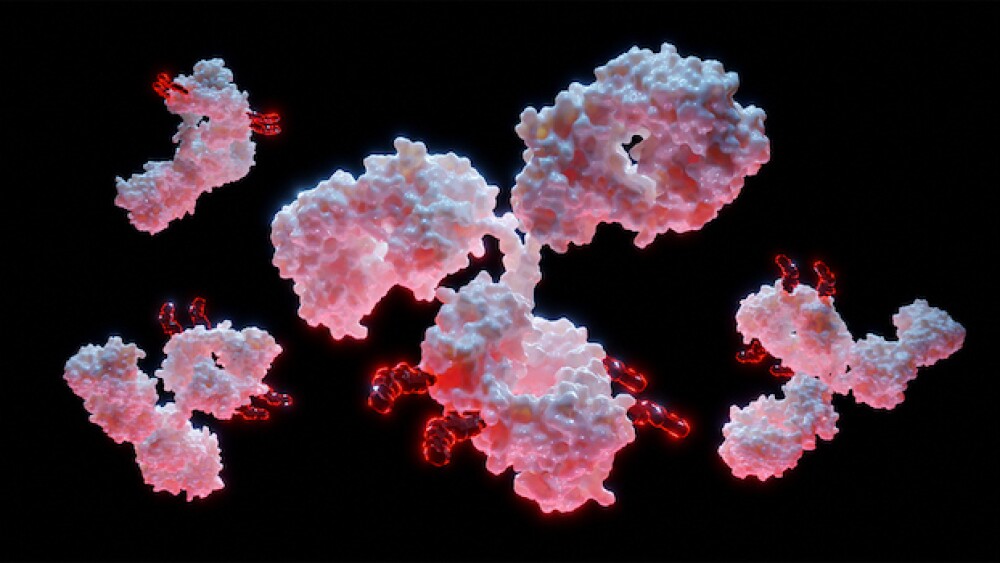The companies presented data from two pivotal studies of Dato-DXd, focusing on safety concerns and survival data for the investigational antibody-drug conjugate candidate in lung and breast cancer.
Pictured: 3D rendering of antibody-drug conjugate molecules with cytotoxic payload/courtesy of iStock
AstraZeneca and Daiichi Sankyo presented data from the pivotal TROPION-Lung01 and TROPION-Breast01 studies at the European Society for Medical Oncology Congress 2023, clearing up safety concerns and touting survival data of its investigational antibody-drug conjugate datopotamab deruxtecan (Dato-DXd).
In the lung cancer study, the pharma partners reported seven fatal episodes of interstitial lung disease (ILD), which were “adjudicated as drug-related by an independent committee,” according to the announcement. In four of these deaths, the primary cause was attributed to disease progression. One such fatality was reported in the comparator docetaxel group.
The companies had previously alluded to these deaths in a July 2023 announcement. At the time, however, they did not provide specific details regarding the fatalities, only revealing that “some Grade 5 events were observed.”
There were far fewer deaths in the breast cancer study, according to the European Society for Medical Oncology (ESMO) readout. In TROPION-Breast01, there was only one fatal episode of ILD that was deemed related to the study drug. This death was likewise attributed to disease progression.
According to Fierce Biotech, AstraZeneca and Daiichi Sankyo—along with study investigators and other oncologists at ESMO—now believe that lung damage on study entry might be a risk factor for fatal ILD following Dato-DXd treatment.
Aside from these deaths, Dato-DXd had a favorable safety profile resulting in a lower rate of grade 3 or higher treatment-related adverse events in both the breast and lung studies.
In terms of efficacy, Dato-DXd cut the risk of disease progression or death by 25% versus docetaxel in the lung cancer study, with a median progression-free survival (PFS) of 4.4 months compared to 3.7 months in the control group. Dato-DXd’s PFS benefit was slightly better in the breast cancer study, reducing the risk of progression or death by 37% compared with the investigator’s choice of chemotherapy.
Both trials also recorded higher objective response rates with Dato-DXd than the respective control groups.
“Datopotamab deruxtecan is central to the future we envision where antibody drug conjugates improve upon and ultimately displace entrenched standards of care, like chemotherapy, in multiple cancer types,” Susan Galbraith, executive vice president of Oncology R&D at AstraZeneca, said in a statement. These findings from TROPION-Lung01 and TROPION-Breast01 will help the companies build their case for using Dato-DXd in these indications.
Still, at the time of the interim analysis, data for overall survival (OS)—the studies’ second primary endpoint—were immature but “numerically favored” Dato-DXd, according to the announcements. Both trials will continue to evaluate OS.
Tristan Manalac is an independent science writer based in Metro Manila, Philippines. He can be reached at tristan@tristanmanalac.com or tristan.manalac@biospace.com.






